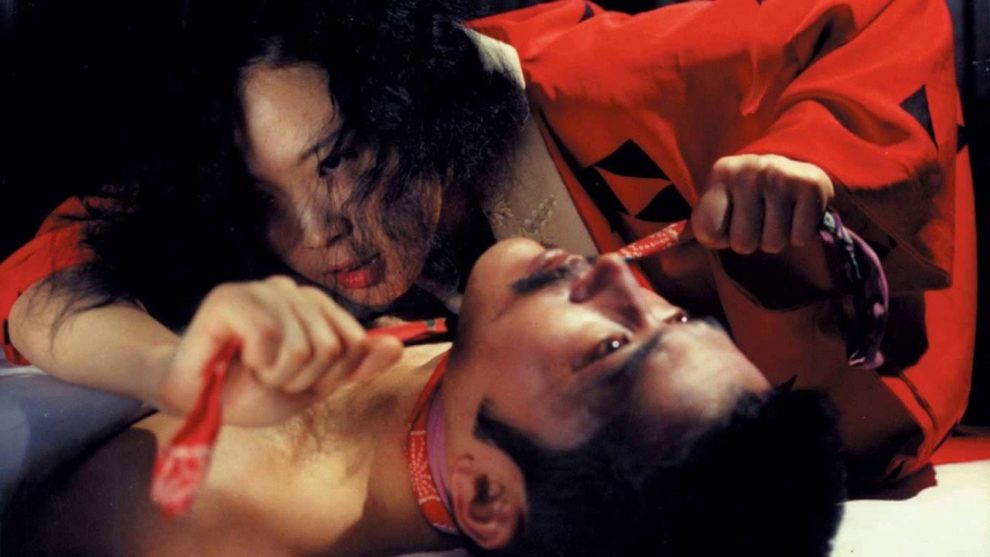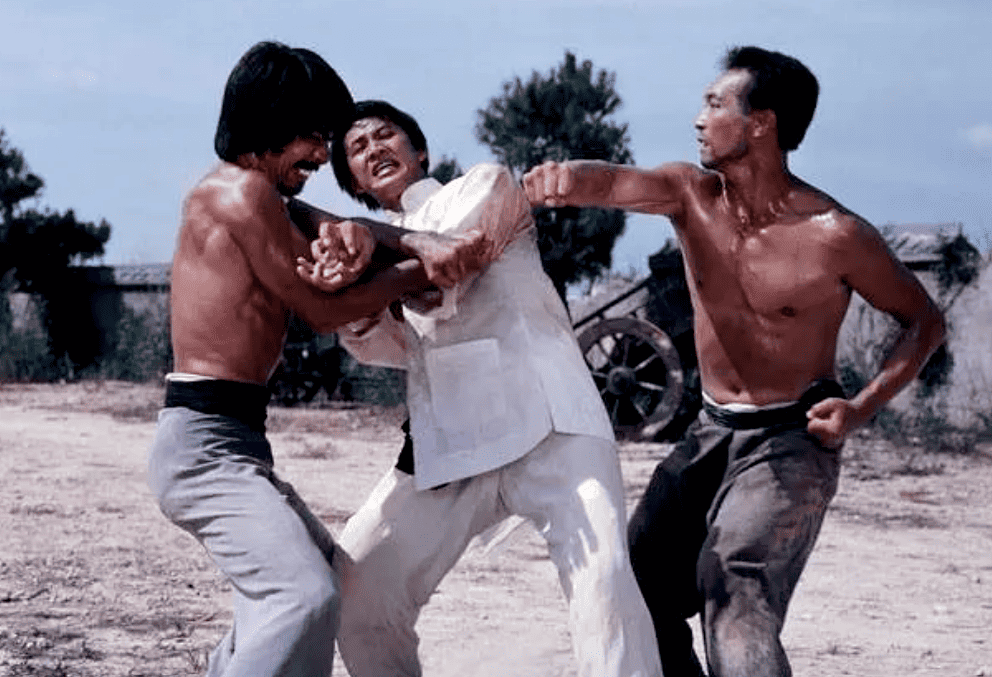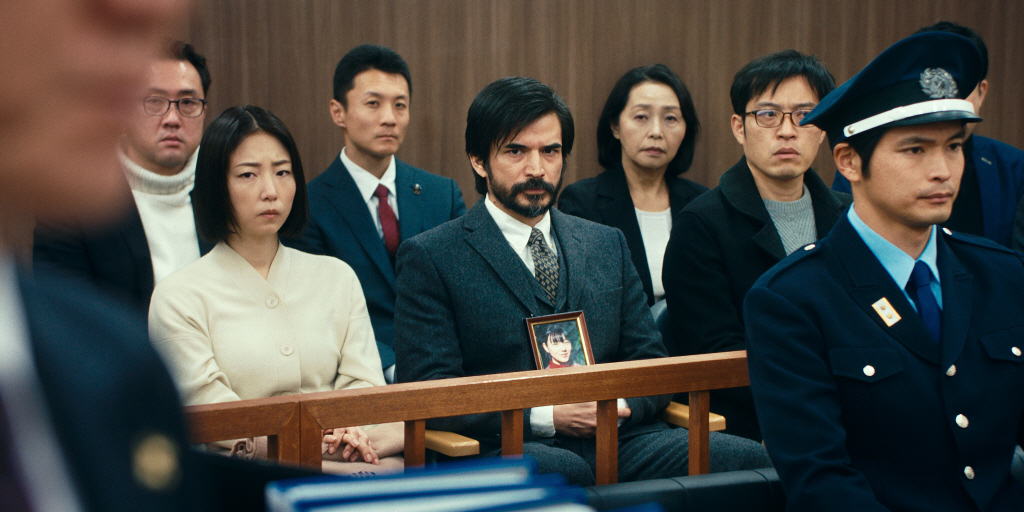Many have probably heard about the scandal surrounding Nagisa Oshima's 1976 feature “In the Realm of Senses”, a story based on an incident involving a woman named Abe Sada, which has been adapted many times in the past as the case sparked quite a lot of controversy at the time. Knowing the film industry of his home country all to well, especially its link to the censors, Oshima decided early on to find producers outside of Japan, and eventually found them in France in order to make his vision of the story, which, upon its release and screening during international film festivals, was banned in many countries due to its explicit sex scenes. However, if one was to approach this feature, it is necessary to look beyond singular scenes or images and take a look at the context, the deeper message Oshima is after, since “In the Realm of Senses” above all is a story about taboos and their connection to a repressive society, and its often problematic concept of the body.
“In the Realm of the Senses” is streaming on MUBI Europe
The story takes place in 1936 when young Abe Sada (Eiko Matsuda) is a servant working in a hotel, but is also often asked by her female boss to take care of the sexual desires and needs of the customers, since she has been a prostitute in the past. While she is mostly disgusted by the male clients, she is, however, quite taken with the laid-back husband of the owner, a man named Kichizo (Tatsuya Fuji). They both start an affair, which becomes increasingly serious as they fall for each other, which results in Kichizo's decision to continue their relationship further away, in a small hotel where they check in as a freshly married couple.
Nevertheless, their passion for each other takes on rather drastic forms, with Sada insisting on Kichizo to not leave the hotel room and eventually stop sleeping with his wife altogether. Additionally, their passion for each other has also been the topic of some gossip among the hotel personnel, who show their disgust for the open sexuality of the two of them, which Kichizo tries to shrug off while Sada's reaction becomes increasingly violent. Eventually, their passion turns into something quite different, when the act of sex is simply not enough anymore for Abe, whose obsession for Kichizo's body, his devotion and death change the nature of their relationship and love for each other.
Although the nature of their relationship, especially due to its openness and explicitness, is often the focus of Oshima's feature, the reactions to Abe's and Kichizo's passion for one another is perhaps more interesting and quite revealing. The society which Oshima depicts seems to have a quite ambivalent, if not paradoxical relationship to the human body, passion and sexuality, a notion highlighted in many scenes, such as the sequence involving a drunk beggar, whose exposed private parts become the center of ridicule and fascination for the crowd that gathers around him. As perhaps typical for this narrative, the humiliation of the poor man does not stop there, as a group of children throws snowballs at his exposed testicles and, after having recognized Abe Sada and following her for a while, he falls into a puddle of cold, dirty water, adding to the entertainment and lust for sensation of the crowd.
Love, passion and sexuality are often kept a secret, are hidden from the public eye, resulting in the idea of the “forbidden look”. Quite frequently, emphasized by the use of close-ups, we see people, servants in the hotel or other people, observing sexuality with a mixture of fascination and disgust, especially when it has become too indiscreet or public, like in the case of Abe and Kichizo. These looks seem to hint at a moral code, a set of taboos which creates repression, a dangerous concept resulting in passion and sex being, quite literally, hidden behind closed doors.
Throughout his work, Oshima has often depicted the problematic link between Japanese politics, society and the body, and has been interested in its source. As sex and passion have become a taboo, it has created an obsession as well as a strange understanding of those concepts, a darkness which also finds its way into Abe's and Kichizo's love. The utopia of love they have created is, as especially Abe realizes, temporary, resulting in her desire to have her lover to herself and eventually consume him. Apart from being a radical diversion from gender roles within Japanese society, her insistence of being dominant and making Kichizo's body her own, can be seen as a result of a society condemning sex and lust, and rather concentrates on the destruction of the body, as the image of soldiers marching seems to indicate.
In the end, “In the Realm of Senses” is often a bit sensationalist, but nevertheless quite interesting and thought-provoking feature. Nagisa Oshima deals with issues like taboos, sexuality and repression, thus giving his viewer insight into a deeply disturbed society and the reality of his home country.

















Which of my following association of ideas from in the Realm of the Senses film is true or false and which of other elements must be added probably too:
A so erotic film with a lot of porn scenes in order to commercial aims!
Or
A film on pink genre!
Or
A documentary film that only narrate a real story amid World War 2 in Japan country in 1936!
Or
A severe revolt and rebellion against prostitution as an occupation in class societies
Or
A film that portray eroticism pleasurable consequences
Or
A Film that worship sensualism and sybaritism and libertinism especially on overindulgence in sexual intercourse and hedonistic orgies and pornography
Or
A film on transmutation and transformation a young belle and amiable and attractive whore, as protagonist, personality
Or
A film that want to instill us only acceptable orgy and sensualism are among those persons that none of them don’t work in whorehouse as whore and sex slave alike sexy dolls. for instance those persons that live together in a home as husband and wife or free love and alike experience real love eternally.
Or
A film that wants to say us prostitutes and geishas never can experience real love in their lifetimes. Instead they are senseless alike sexy dolls that only give their bodies as their livelihood in order to their customers mulish lust satisfaction
Or
A film that worship libertinism and sensualism and sybaritisam at the outset. but finally conclude that only acceptable sybaritism and sensualism and hedonism are in family environments and alike. instead it severely criticize from those sensualism and sybaritism that exist in whorehouse and alike.
Because these kind of orgies are unidirectional. Such a way that sex slaves and sex workers don’t please proportionally and innately at all.
That is why the film pivotal character as protagonist chokes one of her customers and cut his penis with big knife at the end
Why?
Because mentioned relatively rich person was only bordello customer that she fell in love him a lot inherently.
She had slain him horribly at the end.
Because she loved him a lot.
Of course it seems that she revenged him horribly at the end.
Why?
Because mentioned prostitute wanted to monopolize him for herself. and even amid of film she forewarn him frequently that even he isn’t allowed to sex with his legal wife. Instead he must sex her merely.
But that married man was a satyr guy and he sexed with every girl and women ceaselessly.
Even he sexed with a 68 years old geisha too. I mean his sexual intercourse wasn’t normal.
Because he has satyriasis.
Because no one sex with an old woman greedily when a lot of sexy young girl exist and he can se x with them easily too.
So, his sexual intercourse was a kind of mental sickness too.
Even that married master man in one of the film dialogs said that only whenever he goes WC to piss his cock is free. Instead as long as he doesn’t fall asleep he must sex continuously even with old women that haven’t any sexual attractions too.
One of other symbolic scene was a scene that protagonist prostitute said that whenever her customers insert their dicks into her vagina,…as if she became strangling.
That is why she strangled her main customer that she loved him a lot finally too.
Meantime she cut his penis cruelly, because she believed on only in these conditions her amorously feeling with him is perpetuated.
Please notice that the film events that it say it has been inspired from a real adventure in Japan country midst in world war 2 in 1936 has an other important symbolic scene too.
A scene that japanes soldiers are departing to war amidst their compatriots encouragement and conversely the master as second protagonist is going to whorehouse shamefully.
Perhaps the filmmaker want to say his lookers that real pleasure is extremism patriotism not overindulge in libertinism and sensualism outside of family environment and alike.
In any case I haven’t found out that how were the film main messages?
Was it only a real narration from a real story?
Or not
Had it commercial aims merely?
Or not
Was it merely an artistically film?
Or not
Has it moral messages?
Of course I as one the film fan watched it eagerly even for 2 times repeatedly.
Because I love porn and erotic scenes and I believe on most people in around of world think alike me too.
Because libido has pivotal role in our life!
Maybe the film main message was a so severe reproof from those social systems that girls and women are as merely males limitless sexual instinct quelling and women and girls are metamorphosed to sex slaves and sex workers and they can’t experience pleasurable experiences alike male proportionally.
Meantime it seems one of other film main messages was a person must be moderate not extremist or minimalist at all.
Extremism in any phenomena whether in sex or thinking system or lifestyle,…has so horrid bad end aftermath finally.
I wish it was adopted attitudes that all of us have been noticed that what were the film main messages? And in order to decode this matter, its filmmakers and scriptwriter,…must describe mostly.
Of course the film motif was exaggerated.
Because I extremely love overindulgence in sensualism and sybaritism right alike people masses.
But I love other things a lot too. It is so important for us that we create balance in our different vital needs proportionally.
Although libido form all of us main personality, whether we want or no.
It seems irrespective the filmmakers wanted to narrate a real story dramatically and attractively they wanted to say us sex slavery such a way that one of partners play sexy dolls role only is so inhumanely and dreadfully and unjust!
Meantime they wanted to criticize from unsymmetrical class societies too.
Lovemaking and orgy is so superb on condition that it were bilateral not unilateral!